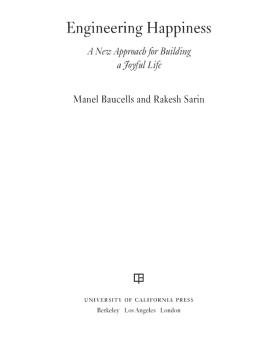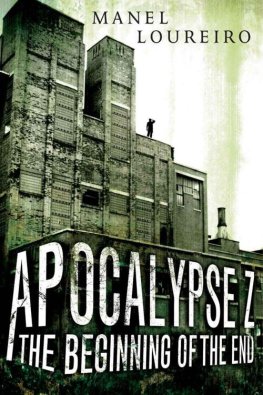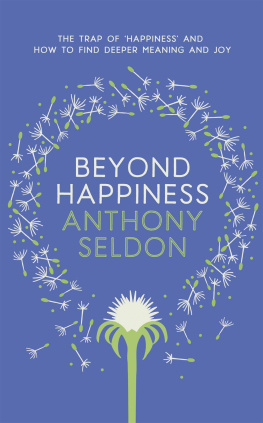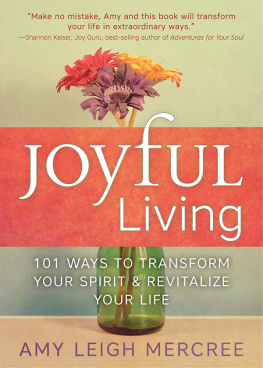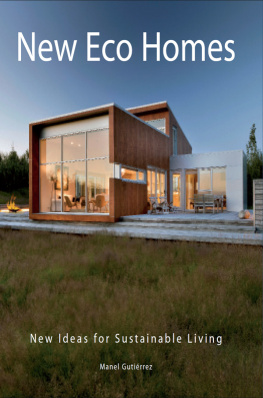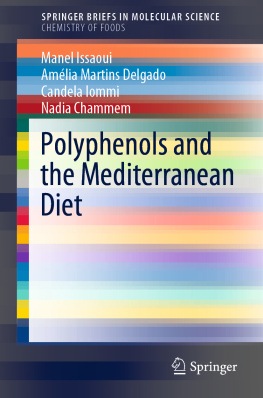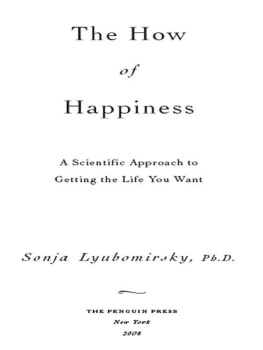Baucells Manel - Engineering happiness: a new approach for building a joyful life
Here you can read online Baucells Manel - Engineering happiness: a new approach for building a joyful life full text of the book (entire story) in english for free. Download pdf and epub, get meaning, cover and reviews about this ebook. City: Berkeley;Californie, year: 2012, publisher: University of California Press, genre: Romance novel. Description of the work, (preface) as well as reviews are available. Best literature library LitArk.com created for fans of good reading and offers a wide selection of genres:
Romance novel
Science fiction
Adventure
Detective
Science
History
Home and family
Prose
Art
Politics
Computer
Non-fiction
Religion
Business
Children
Humor
Choose a favorite category and find really read worthwhile books. Enjoy immersion in the world of imagination, feel the emotions of the characters or learn something new for yourself, make an fascinating discovery.
- Book:Engineering happiness: a new approach for building a joyful life
- Author:
- Publisher:University of California Press
- Genre:
- Year:2012
- City:Berkeley;Californie
- Rating:3 / 5
- Favourites:Add to favourites
- Your mark:
- 60
- 1
- 2
- 3
- 4
- 5
Engineering happiness: a new approach for building a joyful life: summary, description and annotation
We offer to read an annotation, description, summary or preface (depends on what the author of the book "Engineering happiness: a new approach for building a joyful life" wrote himself). If you haven't found the necessary information about the book — write in the comments, we will try to find it.
Baucells Manel: author's other books
Who wrote Engineering happiness: a new approach for building a joyful life? Find out the surname, the name of the author of the book and a list of all author's works by series.
Engineering happiness: a new approach for building a joyful life — read online for free the complete book (whole text) full work
Below is the text of the book, divided by pages. System saving the place of the last page read, allows you to conveniently read the book "Engineering happiness: a new approach for building a joyful life" online for free, without having to search again every time where you left off. Put a bookmark, and you can go to the page where you finished reading at any time.
Font size:
Interval:
Bookmark:

University of California Press, one of the most distinguished university presses in the United States, enriches lives around the world by advancing scholarship in the humanities, social sciences, and natural sciences. Its activities are supported by the UC Press Foundation and by philanthropic contributions from individuals and institutions. For more information, visit www.ucpress.edu.
University of California Press
Berkeley and Los Angeles, California
University of California Press, Ltd.
London, England
2012 by The Regents of the University of California
Library of Congress Cataloging-in-Publication Data
Baucells, Manel, 1966
Engineering happiness : a new approach for building a joyful life / Manel Baucells and Rakesh Sarin.
p. cm.
Includes bibliographical references and index.
ISBN 978-0-520-26820-3 (cloth : alk. paper)
ISBN 978-0-520-26821-0 (pbk. : alk. paper)
1. Happiness. I. Sarin, Rakesh, 1948 II. Title.
BF575.H27B38 2012
152.42dc23
2011034436
Manufactured in the United States of America
20 19 18 17 16 15 14 13 12 11
10 9 8 7 6 5 4 3 2 1
The paper used in this publication meets the minimum requirements of ANSI/NISO Z39.48-1992 (R 2002) (Permanence of Paper).
To my parentsManel
To Anna, Kavita, Ravi, Kyle, and KatelynRakesh
Our stable sources of happiness
We are what our deep, driving desire is. As our deep, driving desire is, so is our will. As our will is, so is our deed. As our deed is, so is our destiny. Upanishad
Socrates and Aristotle regarded the human desire to be happy as self-evident. All subordinate goalsincluding health, wealth, and virtueare sought because they ultimately lead to happiness. In turn, data shows that happy people tend to be healthier, live longer, and have better social relationships. The pursuit of happiness explains the billions of dollars spent each year on consumer goods, from cosmetics and fashion apparel to computers and new cars. Who among us does not want to be happy?
In recent years, lots of books on happiness have been written. This one is different.
This is a book on happiness written by engineers. Engineers love to solve puzzles. Engineers at play have solved countless puzzles and given the world amazing things such as skyscrapers, bridges, cars, televisions, planes, computers, and cell phones. Engineers have built useful and beautiful things to alleviate pain and suffering and to increase the comfort, well-being, and even happiness of all. That got the two of us thinking about the nature of happiness, and we ventured the question: Can happiness itself be engineered?
Simply put, engineers strive to understand, quantify, and manipulate the physical world from computer chips to steel. Engineers play with physical objects, discover their underlying properties, and create formulas to predict their behavior. Would the same mind-set work for something as elusive as happiness?
Perhaps you're thinking: What can two pointy-headed math geeks possibly teach me about happiness? As any good, curious engineers would do, the two of us set out to define, measure, and discover the properties of happiness in a systematic and analytical way. Our curiosity has led us to some fascinating findings, the most important of which is our belief that happiness can, in fact, be engineered.
We begin with the crucial observation that
HAPPINESS equals REALITY minus EXPECTATIONS
We call this the fundamental equation of happiness. In order to engineer happiness, we propose a set of six laws that govern our emotions. We call them the laws of happiness. Each of these laws modifies the fundamental equation of happiness, making it more precise and applicable to a wide range of life choices. Our claim is that through planning and acting on these six principles, happiness becomes a controllable and predictable possibility.
To some, happiness is like a pendulum. It may swing back and forth, but will always return to the center. According to this view, there is not much one can do to fundamentally change our base level of happiness. Our view is different. We argue in this book that happiness is like a sailboat. Indeed the wind and ocean currents influence its movements, but you have the control of the rudder. Without your exerting control, the sailboat drifts. Our laws of happiness serve as the rudder that will help you guide your sailboat to a happier destination.
The very essence of attaining a joyful life is a choice. Once you understand the nature of happiness and master its laws, as described in this book, we believe that you can lay the groundwork for building an amazing life brimming with happiness.
Leticia Camilher Camargo has been our research assistant for this project. Her main task was to dig up the large literature on happiness and connect all the scattered ideas with our framework. Along the way, Leticia has provided many lively stories and examples and has helped make the book more readable. Her contribution has been essential.
Craig Boreth did an excellent job of editing and rearranging the material to improve the flow of ideas. Madeleine Adams provided the final quality control through her careful copy editing.
IESE Business School and UCLA's Anderson School of Management provided financial assistance for this project.
Ralph Keeney, from Duke University, saw the need for including concrete guidelines on how to be happy. Following this recommendation, we wrote the chapter Building a Happier Life. Ana Garca Bertrn, our translator into Spanish, gave us suggestions for improving the flow of the original version. Melissa L. Caldwell, from UC Santa Cruz, made suggestions on incorporating cultural influences on happiness.
Vivien Steger and Theodore Treantafelles helped in editing and rewriting some of the stories in the book. Anna Yang and Kavita Sarin provided valuable input.
Many other colleagues and friends have helped us along the way: Kelly See, from NYU, for pointing us toward research on stability of relationships; Ada Ferrer-i-Carbonell, from the Universitat Autnoma de Barcelona, for her important research and hospitality. Other colleagues who read the book and gave suggestions are Silvia Bellezza, a PhD candidate from Harvard, Steven Lippman from UCLA, Robin Keller from UC Irvine, Mike Norton from Harvard Business School, and Peter Wakker from Erasmus University.
Eva Maria Lozano provided the nice tocometer recording. Xavi Viladiu converted the book into audio format, which helped the revision. Lucia Ceja helped us improve our understanding of flow and engagement; Connor O'Neill brought to our attention karma yoga; and Gigi Le suggested the word crescendo to us. Sonia Clotet and German Loewe read the manuscript and made many insightful comments.
Several of the stories in the book are real. Here are their direct or indirect contributors: Juan Carlos Castaeda, Maite Mijancos, Eduardo Martinez-Abascal, Irene Perdomo, Marta Raurell-Ramoneda, and Xavi Viladiu.
Many friends have enthusiastically read the book and given us suggestions. Among them are Francesc Baucells, Albert Farr, Grace Lau, Susy Masi, Roger Romance, Daniel Smith, and Marta Ventura.
Shall we be merry? Shakespeare
Who among us has not dreamed of winning the lottery or coming into great wealth, thus ensuring a life of carefree bliss and never-ending happiness for the rest of our days? After all, if we just had that bottomless bank account, all of our worries and insecurities would fade into the distance like the runway beneath our new Gulfstream G650 private jet. Does happiness really work that way? Can it be bought, despite what the old clich says? Here's the story of one man who lived the dream, and his answer is a resounding No.
Font size:
Interval:
Bookmark:
Similar books «Engineering happiness: a new approach for building a joyful life»
Look at similar books to Engineering happiness: a new approach for building a joyful life. We have selected literature similar in name and meaning in the hope of providing readers with more options to find new, interesting, not yet read works.
Discussion, reviews of the book Engineering happiness: a new approach for building a joyful life and just readers' own opinions. Leave your comments, write what you think about the work, its meaning or the main characters. Specify what exactly you liked and what you didn't like, and why you think so.

